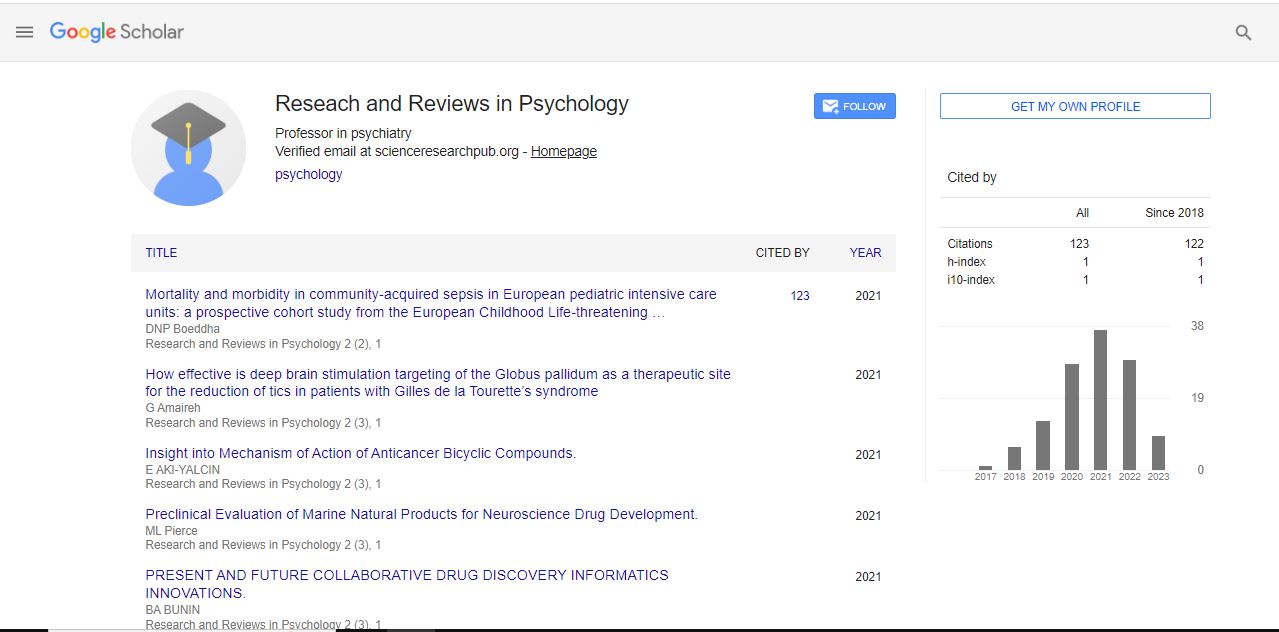Perspective, Res Rev Phys Vol: 4 Issue: 3
Cognitive Psychology: Analyzing Human Cognition and Behavior Histories
Neumann Zaki*
1Department of Psychology, Stanford University, Stanford, USA
*Corresponding Author: Neumann Zaki,
Department of Psychology, Stanford
University, Stanford, USA
E-mail: zaki.n@gmail.com
Received date: 02 September, 2023, Manuscript No. RRPY-23-117727;
Editor assigned date: 04 September, 2023, PreQC No. RRPY-23-117727 (PQ);
Reviewed date: 18 September, 2023, QC No. RRPY-23-117727;
Revised date: 25 September, 2023, Manuscript No. RRPY-23-117727 (R);
Published date: 05 October, 2023 DOI: 10.4172/rrpy.1000345.
Citation: Zaki N (2023) Cognitive Psychology: Analyzing Human Cognition and Behavior Histories. Res Rev Phys 4:3.
Description
Cognitive psychology is a dynamic and significant field that explores the complexities of human cognition, examining the processes underlying thoughts, emotions, and behaviors. It requires understanding how the mind processes information, solves problems, makes decisions, and interacts with the world. It is a branch of psychology that focuses on the study of mental processes. It aims to understand how people acquire, store, process, and use information from the environment. These mental processes include perception, attention, memory, language, problem-solving, and decision-making. Cognitive psychologists aim to explain how individuals think, learn, and remember, as well as the underlying neural mechanisms.
Historical development of cognitive psychology
Cognitive psychology has its origins in the late 19th and early 20th centuries. Several significant developments affected the field:
Gestalt psychology: Gestalt psychology, which emerged in Germany in the early 20th century, emphasized the importance of understanding mental processes as whole rather than isolated components. It influenced the study of perception and problemsolving.
Behaviorism: Behaviorism, dominant in the early 20th century, focused on observable behavior while avoiding mental processes. As a result, anxiety with behavioral theories of complicated cognitive incidents developed.
Cognitive revolution: The cognitive revolution of the 1950’s and 1960’s marked a shift in psychology. Researchers began to explore mental processes more explicitly, leading to the development of cognitive psychology as a distinct field.
Principles of cognitive psychology
Cognitive psychology is assisted by several fundamental principles that indicate its approach to understanding human cognition:
Information processing: Cognitive psychologists consider the human brain to be an information-processing system, similar to a computer. They examine to how information is received, processed, and utilized to direct behavior.
Internal representations: Cognitive processes are thought to involve the creation and manipulation of internal mental representations.
Attention: Attention plays an important role in cognitive processes. Attention can be selective, sustained, or divided, depending on the cognitive task.
Memory: Memory is central to cognitive psychology. It is divided into sensory memory, short-term memory, and long-term memory. Researchers study how information is encoded, stored, and retrieved.
Language and communication: Cognitive psychology explores language acquisition, comprehension, and production. It investigates how language structures thoughts and influences communication.
Problem solving: Problem-solving is an important area of study in cognitive psychology. Researchers examine how people perform and solve difficult tasks, from puzzles to real-world challenges.
Influential theories in cognitive psychology
Cognitive psychology has produced several influential theories that provide valuable insights into the workings of the human mind. Some of the most significant theories are:
Information processing model: This model likens the mind to a computer, processing information through various stages, from input (sensory information) to processing (cognitive operations) and output (behavioral responses).
Cognitive development theory: Jean Piaget's theory focuses on the cognitive development of children.
Social cognitive theory: Albert Bandura's theory emphasizes the role of observational learning and the impact of social influences on cognitive processes and behavior. It introduced the concept of selfefficacy..
Applications of cognitive psychology
Cognitive psychology has numerous practical applications in various domains:
Clinical psychology: Cognitive-Behavioral Therapy (CBT) is a widely used technique in clinical psychology. It helps individuals manage conditions such as depression, anxiety, and post-traumatic stress disorder by addressing negative thought patterns.
Human-computer interaction: Cognitive psychology leads the design of interfaces that are simple to utilize. It ensures that technology is intuitive and optimizes users' cognitive processes.
Advertising and marketing: Advertisers leverage knowledge of cognitive processes to design persuasive messages and advertisements that acquire the focus of consumers and influence their choices.
Problem-solving and decision-making: Cognitive psychology provides insights into effective problem-solving and decision-making techniques, which are valuable in various professions, from management to law enforcement.
 Spanish
Spanish  Chinese
Chinese  Russian
Russian  German
German  French
French  Japanese
Japanese  Portuguese
Portuguese  Hindi
Hindi 